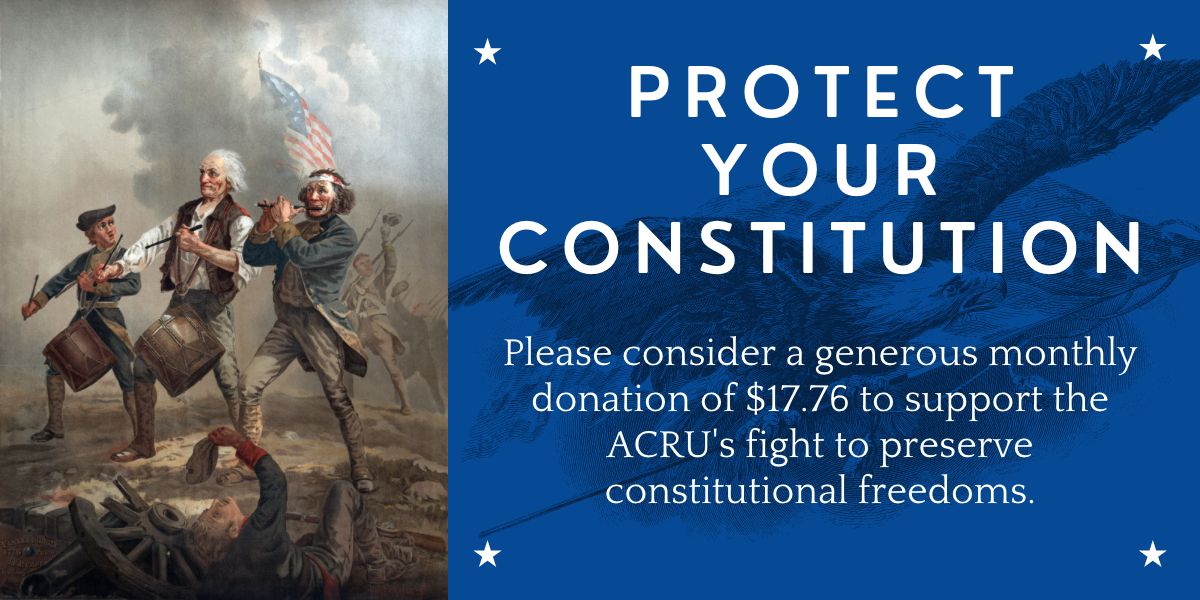
John Armor: President Bush and the Constitution aren't Enemies
ACRU Staff
August 16, 2007
This Op-Ed was originally published in HumanEvents.com
The latest spate of articles accusing the Bush Administration of trampling the US Constitution in prosecuting the War in Iraq have quoted Bruce Fein, cited variously as a “conservative lawyer” and “a deputy attorney general in the Reagan Administration.” He is not being quoted because he is a reliable source but because he says what the opponents of the war want said. Factual inquiry stops there.
On 5 August, John Diaz, Editorial Page Editor of The San Francisco Chronicle penned the latest anti-war tirade about President Bush’s July 17 Executive Order freezing the assets of certain persons who are aiding the enemy in Iraq. Bruce Fein was liberally quoted.
Diaz decries the Order as,”Bush’s most brazen defiance of the Constitution.” But the country and intellectual argument in general would be greatly served if he, Mr. Fein and most members of the press would bother to crack a history book. For instance, when the US declared war on Japan and Germany, one of its first acts was to freeze the assets of Japanese and German companies in the US. One of those was Bayer Aspirin, which was a subsidiary of a German firm. Oh, the aspirin factories stayed open, pumping out those useful pills. But they were placed under trusteeships, with none of the profits repatriated to Germany. After the War, things all got sorted out.
It is only common sense in any war, to shut off the economic benefits to your enemy. Dollars, and products, in enemy hands turn into weapons that kill Americans. What part of that doesn’t Diaz understand?
The Diaz article further proclaims the President’s Order “particularly troubling in the hands of a White House that has suggested that domestic war critics are emboldening U.S. enemies in Iraq.” Mr. Diaz appears unaware that items seized in wartime to keep them out of enemy hands or to serve the purposes of American troops, are legal seizures as long as compensation is paid — after the war is over. And, some criticisms of war policies do aid the enemy, like the America First effort headed by Charles Lindbergh in WW II, whose purpose was to keep America neutral, and out of the war against Germany.
Bruce Fein commits the greatest hyperbole, however, by claiming the Order “is the greatest encroachment on civil liberties since the internment of Japanese Americans in World War II.” Now, I know Bruce Fein. I used to respect him as having a fine, legal mind. Past tense.
At the time, and to its disgrace, the US Supreme Court ruled 6-3 to uphold the internment of the West Coast Japanese-Americans. Forty years later, the test case, Korematsu v. US was reversed because the original decision was found unconstitutional. Either Bruce does not know the history of the WWII internments, in which case he should have kept quiet about it. Or, he did know and falsified the facts.
Another bete noire of Fein and the anti-war left is the Foreign Intelligence Surveillance Act (FISA), just amended by Congress over the opposition of Democrats. FISA, of course, provides the mechanism for surveilling terrorists’ contacts with people in the United States. (The President has Constitutional authority, as the FISA court has held, to gather intelligence overseas without court approval.)
The truth is that wars are not fought (and won) by lawyers. The US did not say please and thank you before breaking the Japanese naval code in WW II. Americans storming the beaches in Europe or the Pacific then did not go ashore with arrest warrants naming specific enemy to be arrested and “brought to justice” in US courts. Gathering intelligence while protecting your sources is as important to warfare as the movements of armies and navies.
The Diaz article wouldn’t be complete without the obligatory quote from the ACLU’s national security counsel that “This order could have a serious chilling effect on charitable contributions intended to ease the suffering in Iraq.” Ahem. We have several on-going criminal trials in the US today concerning Islamic “charities” charged with using gifts to buy bombs, weapons and ammunition. In the ACLU’s worldview, if there even a remote possibility of something having a charitable purpose, you let the money go through. But to a President in wartime if there’s a possibility of “charity” being turned into bombs and bullets, you stop the money flow.
Fein asserts that, “‘King George III really would have been jealous of this power.” (Bruce, King George DID have this power, and used it in all areas of British control during the American Revolution.) Look it up. Mr. Diaz concluded by observing that, “The framers of our Constitution, however, would be appalled.” What nonsense. When the Founders mutually pledged their “lives, fortunes and sacred honor,” to the cause of freedom in signing the Declaration of Independence, it was a real commitment, not a mere political gesture.
The Founders understood that the Constitution was not a suicide pact. They would respect the efforts of a modern American government to use every legal means to prevail in a war. The Founders would not be appalled at President Bush’s actions. They would be appalled at the gross misunderstandings of Messrs. Fein and Diaz of the history of the US and its Constitution.
John Armor practiced in the US Supreme Court for 33 years. His third of seven books is Manzanar, about the civilian imprisonments in WW II. His latest book will be “These are the times that try men’s souls, about Thomas Paine. He is counsel to the American Civil Rights Union.
JOIN ACRU's PATRIOT CLUB




